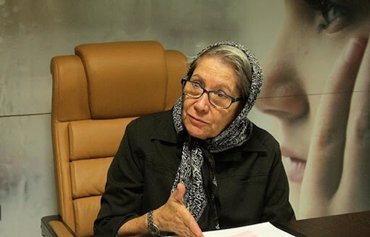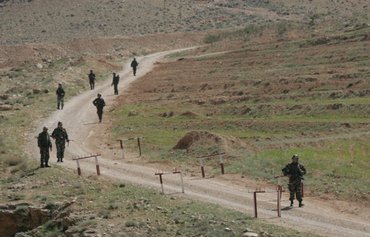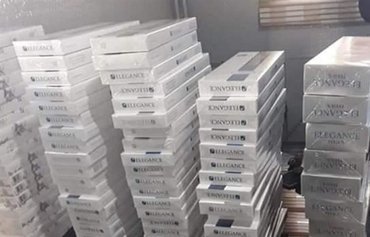BEIRUT -- Medicines produced in Iran and Syria that do not conform to international legal and industry standards are filling the shelves of pharmacies in parts of Lebanon dominated by Hizbullah, pharmacists told Al-Mashareq.
These drugs -- often smuggled into the country via border crossings with Syria that the Iran-backed party controls -- are widely available at its affiliated health centres and pharmacies, they said.
Hizbullah also has sought to capitalise on the market saturation to expand its influence by offering non-standard medications at a discounted price.
Party officials have made it known that al-Sajjad card holders can now buy medicine from al-Mortada pharmacies and other co-operating pharmacies at discounted prices, according to a June 3 broadcast on MTV.
![Lebanese pharmacists have been complaining of the invasion of smuggled Iranian and Syrian medications that do not conform to international standards. [Nohad Topalian/Al-Mashareq]](/cnmi_di/images/2023/07/14/43023-leb-pharmacy-invasion-600_384.jpg)
Lebanese pharmacists have been complaining of the invasion of smuggled Iranian and Syrian medications that do not conform to international standards. [Nohad Topalian/Al-Mashareq]
According to the report, al-Mortada branches sell smuggled Iranian and Syrian medicines that are not registered with Lebanon's Ministry of Public Health, including drugs for blood pressure, diabetes and other chronic diseases.
More than 150 kinds of Iranian drugs are sold at these pharmacies.
Hizbullah is planning to increase the number of al-Mortada pharmacies from three in total to one pharmacy for each of the six towns under its control in the Bekaa Valley, Beirut's southern suburb and southern Lebanon, the report said.
Public health risk
Lebanon is facing an acute shortage of many medications and a concurrent intensification in smuggling operations, largely due to the economic crisis that resulted in the lifting of subsidies over a year ago.
Medications that are not authorised by the Ministry of Public Health are imported via intermediaries, so uncontrolled supplies of expired or counterfeit medication enter the country, according to Amnesty International.
This poses a public health risk, it said.
Between 2019 and mid-2021, Hizbullah-affiliated health ministers added a number of medications to the ministry's list of approved drugs in violation of legal standards, people familiar with the issue said.
According to a Hermel-based Hizbullah defector, who asked that his name be withheld, Iranian and Syrian medicines "stack the shelves of pharmacies in Baalbek-Hermel, Beirut's southern suburb and in Hizbullah's health centres".
"Hizbullah-affiliated entities smuggle Syrian medications on a daily basis via illegal crossings in Homs and al-Qusayr," he told Al-Mashareq.
"They also smuggle Iranian drugs by land, sea and air, and distribute them to pharmacies affiliated with Hizbullah, especially al-Mortada pharmacies," he said.
Violating industry standards
"We don't approve of any medicines that are illegally smuggled to Lebanon from Iran, Syria or any other country which are not legally registered with the Ministry of Public Health," said Lebanese Order of Pharmacists president Joe Salloum.
"We can't possibly market and sell those drugs in our pharmacies," he told Al-Mashareq. "Smuggled medicines affect Lebanon's health sector, its reputation and its citizens."
The organisation has filed a complaint with the Public Prosecutor's Court of Cassation, he said, and is urging the ministry to shut down these pharmacies.
Medicine sold in Lebanon must meet the standards of the ministry's drug technical committee, and all pharmaceutical products, whether locally manufactured or imported, must be registered with the ministry.
"Those who bring smuggled medicines into Lebanon are known; they're the same people who had smuggled subsidised medicines [out of Lebanon] before the subsidies were lifted," Salloum said.
Some networks smuggle medicines that do not meet World Health Organisation (WHO) or European Medicines Agency standards, he said.
"The problem is that they don't undergo central testing to check their components and quality and to make sure they comply with international specifications," a pharmacist who asked to remain anonymous told Al-Mashareq.
"These medicines are smuggled by people living in border areas, and also by entities affiliated with Hizbullah," he said.
'New spiral of collapse'
"Smuggling medicine is seen as a defiance and evasion of US sanctions on Iran," the pharmacist said.
It helps generate revenue for Iran and Hizbullah, he said, while depriving Lebanon of tax revenue.
Pharmacist Katrina Nasrallah told Al-Mashareq she sells only drugs approved by the WHO and EuroHealthNet, which she receives from approved medical representatives.
She urged consumers to be extra vigilant when they purchase medication and to make sure it is approved by the appropriate international organisations.
"It would be wrong to consider the smuggled medicines as an alternative for filling the shortage of pharmaceutical products," economist Violette Ghazal al-Balaa told Al-Mashareq.
In fact, they represent "unequal competition" with the locally manufactured medications, she said.
"Moreover, smuggled medications don't meet the storage, shipping and quality specifications, as they aren't subjected to any monitoring and don't have official certificates of origin," she said.
The continued smuggling of medicine will negatively reflect on the pharmaceutical industry in Lebanon and the future of factories, companies and workforce in this sector, al-Balaa said.
It is no surprise that Iranian and Syrian medicines are among the smuggled medicines "as long as Hizbullah controls the border crossings", she said.
The continued smuggling of nonstandard medicines "will aggravate the suffering of the Lebanese people", and will have a negative effect on the economy, "since they compete against locally manufactured medications", al-Balaa said.
This, plus the possibility of more sanctions "may throw Lebanon into a new spiral of collapse", she said.

![Smuggled Iranian medicines have been invading the Lebanese market. Seen here is a sample of Iranian medicines purchased by a Syrian refugee family. [Nohad Topalian/Al-Mashareq]](/cnmi_di/images/2023/07/14/43022-leb-meds-refugees-600_384.jpg)






